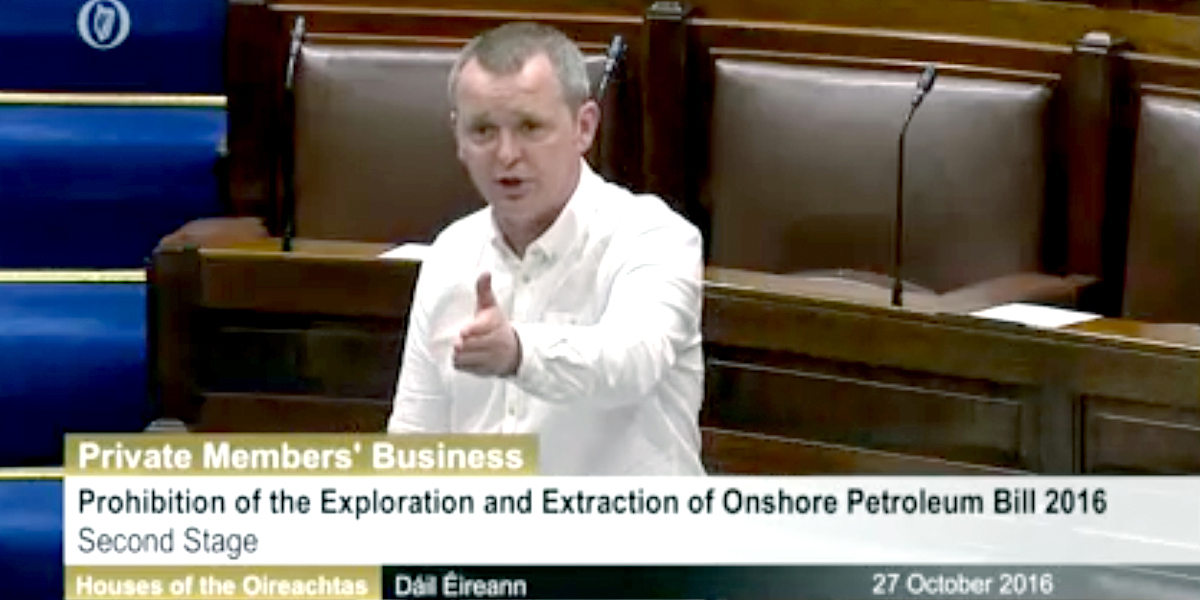

A bill banning hydraulic fracturing, or fracking, in the Republic of Ireland was voted through the Dáil Éireann (the country’s House of Representatives, so to speak) on Thursday.

According to the Irish Examiner, the bill’s passage is “the first step in enforcing a nationwide ban on fracking and it will give the Government 12 weeks before it goes before further parliamentary scrutiny.” The bill has now been moved to the committee stage for further review.
Fracking does not currently take place in the Emerald Isle but three exploratory licenses have been granted. The bill, The Prohibition of the Exploration and Extraction of Onshore Petroleum Bill, was introduced by Dáil member Tony McLoughlin, TD of the Fine Gael party. McLoughlin currently represents Sligo-Leitrim, a constituency that has been marked for potential shale gas exploration.
The legislation initially faced a potential eight-month delay to allow for Ireland’s Environmental Protection Agency to issue a report on fracking, but the Government ultimately decided not to table the proposal.
During a televised debate over the bill, a number of speakers—across parties, no less—passionately argued that unconventional oil and gas operations have significant adverse effects, including its threat to human health, that it pollutes water and drives climate change, and would hamper Ireland’s emissions targets.
Oisin Coghlan, the director of Friends of the Earth Ireland, live tweeted the entire debate.
“Fracking has no place in a low carbon future,” said Joe Carey, Fine Gael TD for County Clare, according to Coghlan’s tweet.
Catherine Connolly, Independent TD for Galway West, said that the bill gives her hope for the country’s ability to act upon the emissions thresholds under the Paris climate agreement.
Timmy Dooley, Fianna Fáil TD for Clare, said, “We should not be looking for new methods to extract a resource so damaging to the climate.”
https://twitter.com/TonyMcLTD/statuses/791705987908530176 expand=1]
To coincide with the bill, the Sustainable Water Network (SWAN) published a report concluding that fracking and other shale-gas operations in Ireland could lead to harmful water contamination and therefore should not be permitted.
The key findings of the report include:
- There are numerous documented impacts on water bodies attributed to shale-gas activities, including increases in concentrations of salinity, methane, heavy metals, naturally occurring radioactive material and reduction in water body levels;
- Many impacts arise due to contamination from well-casing leaks; leaks through fractured rocks; transportation spills and disposal and spillage of inadequately treated wastewater;
- Gaps in legislation and inadequate regulatory capacity mean Ireland would not be in a position to adequately regulate the industry.
“Our research shows that over the past decade there have been many documented impacts to water bodies arising from shale-gas activities,” said one of the report’s authors Dr. Kieran Craven.
“Degradation of the water environment has occurred in regions of the U.S., where regulation has typically lagged behind industry. Based on a comprehensive review of the scientific literature, it is our view that many of these potential impacts would lead to the pollution of both surface and groundwater in the proposed regions of Ireland.”
Kate Ruddock of Friends of the Earth Ireland pointed out to The Irish Times that a number of countries banned fracking, including France, Bulgaria, Scotland, Wales, New Zealand and parts of Austria.
“Governments have decided that fracking is not acceptable and the risks it poses to people’s health is unacceptable,” she said.
In the U.S., Vermont and New York state and a growing number of cities and municipalities have banned fracking as well. (On the flip side, there are pro-drilling state and city governments attempting to ban fracking bans).
Actor and environmental activist Mark Ruffalo also threw his weight behind the Irish bill with an Instagram post.
[instagram https://www.instagram.com/p/BMDRSknhGv_/?taken-by=markruffalo
“Ireland should ban #fracking to protect public health & the environment, like New York did after finding serious risks & harms,” he stated.
The clean energy advocate included a photo of himself holding a sign with the hashtag #backthebill, which has been used on social media to rally support for the ban.

 233k
233k  41k
41k  Subscribe
Subscribe 